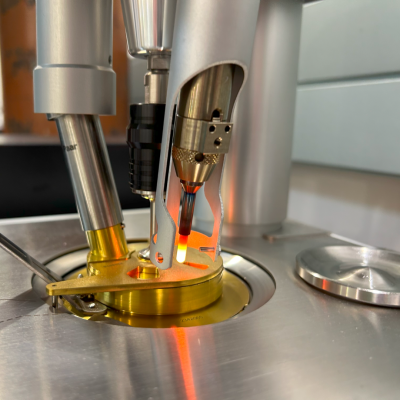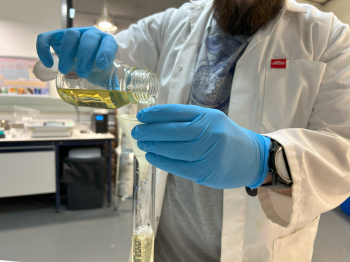Fuelfix
Petroleumfix Laboratory
Fuelfix: The Solution to Diesel Fuel Challenges
Diesel fuel, while essential to many industries, presents several operational challenges, ranging from corrosion and abrasion to microbial infestations. These issues not only reduce fuel efficiency but also lead to costly downtime and repair work. Fuelfix, a revolutionary diesel fuel treatment, has been developed to address these challenges head-on, providing a proactive and efficient solution. By interacting with water in diesel fuel, Fuelfix converts it into a non-corrosive fluid, reducing the negative impact of water, rust, and other contaminants on diesel engines and fuel systems.
Get Started With PetroleumFix Today!
The Role of Water in Diesel Fuel Systems
Water is a major source of problems for diesel engines and fuel systems. It’s not uncommon for water to enter diesel fuel during storage, transportation, and even while fueling. Water in fuel can cause several issues, such as:
Corrosion
Water reacts with the components of the fuel system, including injectors, pumps, and fuel lines, leading to rust and corrosion. Over time, this corrosion significantly reduces the lifespan of these components, leading to expensive repairs.
Fuel Gumming
Water mixes with resins in diesel fuel, causing the fuel to gum up. This gumming can clog injectors and other critical components, further reducing efficiency and increasing maintenance costs.
Abrasive Action
Water in fuel acts as an abrasive, especially when it forms rust particles that are suspended in the fuel. These particles can wear down critical engine components like injectors, causing further inefficiency.
Fuelfix offers a solution by converting this harmful water into a harmless, non-corrosive lubricant that improves fuel efficiency and reduces engine wear.
Fuelfix’s Effectiveness in Combating Water and Corrosion
One of the most notable issues caused by water in diesel fuel is corrosion. Corroded fuel components, such as pumps and injectors, can lead to fuel inefficiency, increased maintenance costs, and a significantly shorter lifespan for engine components.
Fuelfix effectively addresses this problem by converting water into a non-corrosive fluid over time. While it’s important to note that Fuelfix is not a “miracle cure,” the solution does provide a gradual and consistent reduction in corrosion levels. As the product works through the system, it begins to clear rust from the tanks and fuel system components, allowing for smoother and more efficient engine operation.
Water’s Abrasive Effect on Diesel Fuel Systems
Water is often overlooked as a highly abrasive substance, yet its effects are significant. Under the pressure of diesel fuel-injection systems, water particles become suspended in the fuel. These particles, along with any rust and other contaminants, act like granules in a grinding paste, causing rapid wear and tear on engine components.
This abrasive wear is particularly damaging to injector nozzles. As nozzles become enlarged due to erosion, the atomization and spray pattern of the fuel are impaired. This leads to suboptimal fuel combustion, causing a loss of fuel efficiency and an increase in fuel consumption.
Fuelfix effectively eliminates this problem by converting water into a lubricant. By doing so, it reduces the abrasive effects of water, ensuring that the fuel system operates at maximum efficiency and extending the life of critical components.
Combustion-Produced Acids and Their Detrimental Effects
During the combustion process, diesel fuel undergoes chemical reactions that produce oxides of sulfur and nitrogen (SOx and NOx). Although modern diesel fuel has reduced sulfur content, nitrogen—comprising 78% of intake air—remains a significant contributor to acid formation during combustion.
When water is present in the fuel, these oxides react with the water to form sulfuric and nitric acids. These acids, aside from contributing to environmental damage, also enter the engine’s crankcase through the blow-by process. Once in the crankcase, the acids break down the engine oil, reducing its lubricity and accelerating engine wear. Sludging in the crankcase can block oil filters and oil passages, leading to costly engine failures.
Fuelfix helps prevent the formation of these acids by chemically interacting with the water in the fuel, making it inert to the sulfur and nitrogen oxides. This, in turn, prevents the acids from forming, preserving the integrity of the engine oil and reducing wear on engine components.


Microbial Infestation in Diesel Fuel Systems
Bacteria and fungi are known to thrive in the water that accumulates in diesel storage tanks. These microbes feed on the organic materials in the fuel, causing several issues, including:
Fuel Contamination
As bacteria break down fuel, they produce acids and organic material that can contaminate the fuel. This leads to fuel degradation and poor engine performance.
Filter Blockages
Microbial growth can lead to the formation of slime and sludge, which blocks fuel filters and interrupts the fuel supply to the engine.
Corrosion
The acids produced by microbial digestion accelerate corrosion in the fuel system, exacerbating the damage caused by water.
Traditionally, the solution to microbial infestation has been the use of biocides—chemicals that kill living organisms. However, these biocides are highly toxic and can lead to environmental damage and long-term issues. They also fail to address the root cause of the problem, which is the presence of water in the fuel.
Fuelfix offers a more effective and environmentally friendly solution. It works by eliminating the microbial habitat and nutrient sources, effectively killing the microbes. It then dissolves the dead organic material, preventing filter blockages and reducing the need for toxic biocides. Fuelfix’s non-toxic composition makes it a safer and more sustainable solution for microbial control.
Fuel Quality Management
Diesel fuel quality is the responsibility of the end user once it has been delivered to storage tanks. Maintaining fuel quality is essential to preventing breakdowns and costly repairs. To ensure the fuel remains clean and free of contaminants, regular sampling and monitoring are necessary.
Regular Sampling
It is recommended to take fuel samples from the bottom of the tank at least twice a week to check for visible water. If water is present, it can either be removed physically or treated with Fuelfix.
Water Removal
In cases where visible water is found in the fuel, Fuelfix can be dosed at double the regular amount to help clear the water and prevent further contamination.
By proactively managing fuel quality and using Fuelfix, operators can significantly reduce the risk of breakdowns, improve fuel efficiency, and extend the life of their equipment.
Proof of Effectiveness
Fuelfix has undergone extensive testing and trials, particularly in challenging environments such as underground mining operations where diesel exhaust emissions are strictly regulated. These tests have demonstrated the product’s effectiveness in improving fuel efficiency, reducing emissions, and preventing corrosion and wear.
Fuel Consumption
Fuelfix has been shown to reduce fuel consumption by up to 8%, with some cases exceeding 25% and rare instances achieving reductions of over 30%. This represents a return on investment of 200%, as demonstrated by the following example:
Oil Analysis
Oil analysis before and after using Fuelfix shows dramatic improvements in engine oil quality. Key indicators, such as soot contamination, lubricity, viscosity, and wear-metal content, all improve significantly after Fuelfix is introduced to the fuel system.
Exhaust Gas Analysis
Fuelfix has also demonstrated a significant reduction in harmful exhaust gases. Carbon monoxide, nitrogen oxides (NOx), and carbon dioxide levels have been reduced by up to 97% and 70%, respectively, making Fuelfix an effective solution for reducing the environmental impact of diesel engines.
Undesirable Side Effects
A key concern in the additives industry is the potential for harmful side effects. Fuelfix, however, has undergone rigorous testing and has never shown any harmful effects. Unlike petroleum-based additives, Fuelfix adheres strictly to diesel fuel specifications, ensuring that it does not cause long-term damage to diesel engines or fuel systems.
Get Started With PetroleumFix Today!
Water is the primary cause of many of the issues faced by diesel engines and fuel systems. Fuelfix provides a simple yet highly effective solution by converting water into a non-corrosive lubricant, preventing corrosion, abrasive wear, and microbial growth. The product has been proven to reduce fuel consumption, extend the life of engine components, and improve environmental performance.
For the first time, operators have a proactive tool to maintain fuel quality and prevent fuel-related breakdowns. Fuelfix is not just a maintenance product—it’s a game-changer in diesel fuel management. By reducing downtime, improving fuel efficiency, and minimizing environmental impact, Fuelfix is an indispensable tool for anyone operating diesel-powered equipment.

